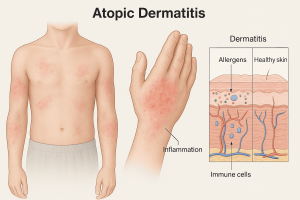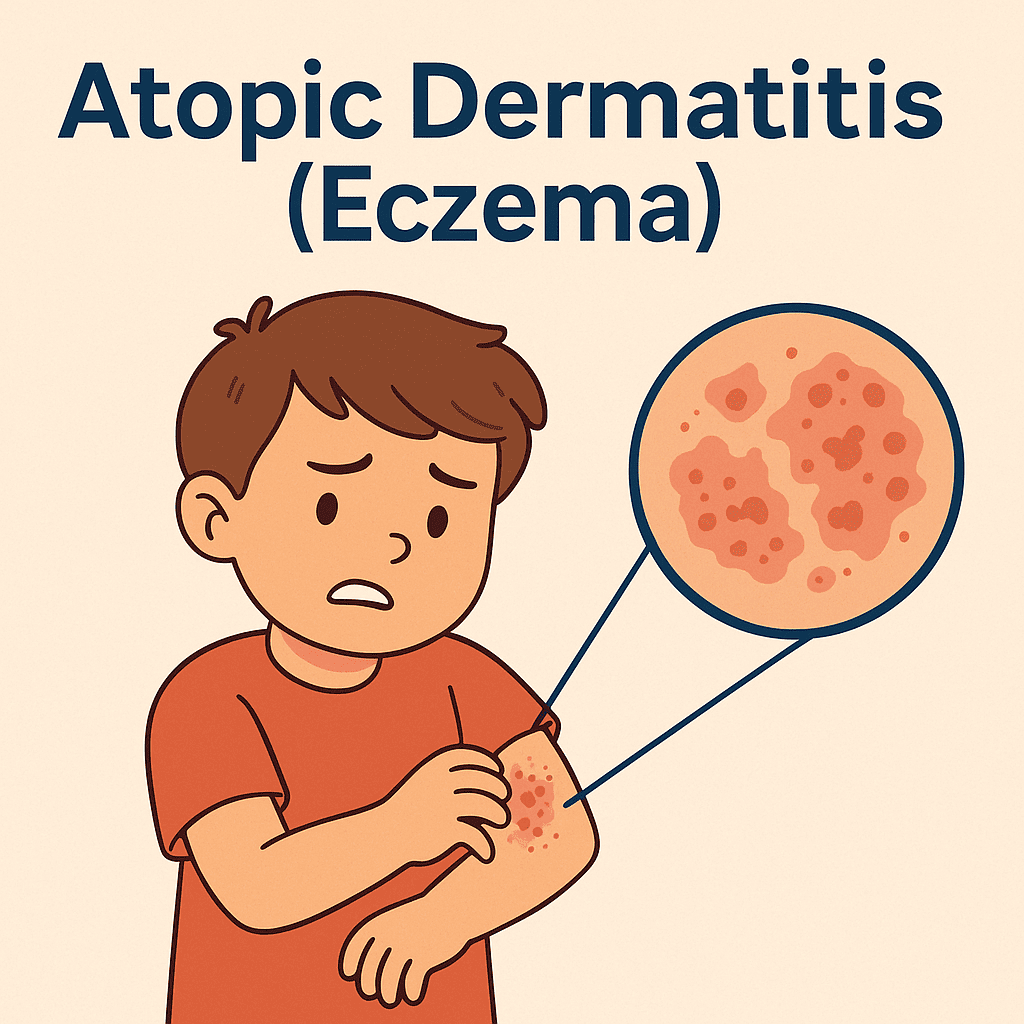Atopic dermatitis, more commonly known as eczema, is more than just dry or itchy skin — it’s a daily battle for millions of people. If you or someone you love lives with eczema, you know how unpredictable and frustrating it can be. But the good news? With the right knowledge and care, it’s absolutely possible to take control and live comfortably.
In this guide, we’ll break down everything you need to know about atopic dermatitis in simple, clear language — no medical jargon, no confusion. Just real, helpful information you can actually use.
What Is Atopic Dermatitis?

Atopic dermatitis is a chronic skin condition that causes the skin to become red, dry, itchy, and sometimes cracked or swollen. You can also read our simple guide to skin allergies to understand more about different skin conditions.
It often starts in childhood but can appear at any age. Some people have it for a few years, while for others, it sticks around for life, coming and going in flares.
Even though it’s called “atopic”, meaning it’s related to allergies, not everyone with atopic dermatitis has allergies. However, many do — especially to things like dust, pollen, pet dander, or certain foods.
And here’s something important: Eczema is not contagious. You can’t catch it from someone else or pass it on.
What Causes Atopic Dermatitis?
Scientists aren’t 100% sure what causes atopic dermatitis, but they know it’s linked to a mix of things:
-
Genes: If eczema, asthma, or hay fever runs in your family, you’re more likely to have it too. (learn more about hereditary allergy causes here).
-
Weakened skin barrier: Healthy skin acts like a shield, keeping moisture in and bad stuff out. In eczema, the skin barrier is weaker, making it easier for irritants and allergens to sneak in.
-
Overactive immune system: In eczema, the immune system sometimes overreacts, causing inflammation even when there’s no real danger.
-
Environmental triggers: Things like heat, cold, soaps, pollution, stress, or allergens can set off eczema flares.
Common Symptoms of Atopic Dermatitis
Eczema doesn’t always look the same for everyone, but the common signs include:
-
Dry, scaly patches
-
Itching (sometimes severe)
-
Redness and swelling
-
Cracks or small cuts
-
Oozing or crusting if the skin gets infected
Symptoms can show up anywhere, but the most common areas are the face, neck, hands, inside the elbows, and behind the knees.
These are also common symptoms seen in many allergic conditions (discover more common allergy symptoms).
What Triggers Eczema Flare-Ups?
Managing eczema means understanding what makes it worse. Some common triggers include dust mites, pet fur allergies, pollen, and even harsh soaps.
-
Soap, detergents, or fragrances
-
Dust mites, pollen, and pet fur
-
Cold, dry air or very hot weather
-
Stress and anxiety
-
Certain foods (like dairy, eggs, or nuts) in some people
-
Sweat and overheating
Everyone’s skin is different, so what triggers one person may not affect another. Keeping a symptom diary can help you figure out your personal triggers.
Types of Atopic Dermatitis
Atopic dermatitis doesn’t look the same for everyone. There are different types based on the location and characteristics of the rash:
1. Classic (Flexural) Eczema
The most common form — found in the creases of elbows, knees, neck, and wrists.
2. Hand Eczema
Affects the palms and fingers. It’s common in people who frequently wash their hands or work with chemicals.
3. Dyshidrotic Eczema
Small, itchy blisters appear on the hands, fingers, and sometimes the soles of the feet.
4. Head and Neck Dermatitis
Primarily affects the face, scalp, and neck. It’s more common in teens and adults.
5. Nummular Eczema
Round, coin-shaped patches of irritated skin, often extremely itchy.
6. Lichenified Eczema
Thick, leathery patches caused by repeated scratching and rubbing.
Each type may need slightly different management strategies. Some forms, like allergic contact dermatitis, can mimic or overlap with eczema.
How Is Atopic Dermatitis Diagnosed?
Doctors usually diagnose eczema based on:
-
Appearance of the skin
-
Family and medical history
-
Possible allergy tests if needed
No single test confirms atopic dermatitis — it’s a clinical diagnosis based on symptoms.
Doctors may also recommend allergy testing to find hidden triggers (learn how allergy testing is done).
Treatment Options: Finding What Works for You
There’s no cure yet for atopic dermatitis, but there are lots of ways to manage it and feel better.
1. Daily Skincare Routine
-
Moisturize, moisturize, moisturize — this is your number one defense. Apply a thick, fragrance-free cream or ointment at least twice a day.
-
Gentle cleansing — use mild, soap-free cleansers and lukewarm water.
-
Pat dry —don’t rub your skin after washing; gently pat it dry.
For some, over-the-counter skin treatments offer quick relief from itching and irritation before needing prescription options.
2. Medications
-
Topical corticosteroids (like hydrocortisone) help calm down redness and itching during flares.
-
Calcineurin inhibitors (like tacrolimus) are non-steroid creams that also reduce inflammation.
-
Antihistamines can help control itching, especially at night.
-
Biologic treatments (like Dupixent) are newer medicines for severe cases and work on the immune system.
3. Lifestyle Changes
-
Wear soft, breathable fabrics like cotton. Avoid scratchy materials like wool.
-
Stay cool — heat and sweat can make eczema worse.
-
Manage stress — mindfulness, yoga, or even simple deep-breathing exercises can make a real difference.
Natural and Home Remedies for Eczema
Many people find comfort in natural home remedies for skin allergies like oatmeal baths or apple cider vinegar treatments for eczema.
-
Oatmeal baths: Colloidal oatmeal can help calm itching and irritation.
-
Coconut oil: Has natural antibacterial and moisturizing properties.
-
Sunflower seed oil: Helps boost the skin’s barrier.
-
Probiotics: Supporting gut health may help reduce inflammation, although research is still ongoing.
-
Aloe vera gel: Soothes irritated skin and reduces redness.
Important: Always patch-test any natural remedy first, and check with your doctor before trying new treatments.
Emotional Impact: More Than Skin Deep
Living with eczema isn’t just a physical struggle — it can deeply affect your emotional well-being. Constant itching, lack of sleep, feeling self-conscious about your skin — it can all take a toll.
Managing eczema’s emotional toll is crucial (read about how allergies affect mental health).
It’s important to know you’re not alone. Seeking support from friends, family, online communities, or even a mental health professional can make a big difference in how you cope day-to-day.
Challenges and Trade-Offs in Managing Eczema
Managing atopic dermatitis means finding the right balance:
-
Fast relief vs. long-term safety: Steroids work quickly but must be used carefully to avoid side effects.
-
Cost vs. effectiveness: Biologics offer great results for some but are very expensive.
-
Natural vs. medical treatments: Natural remedies are gentler but might not be enough for severe flares.
Everyone’s eczema journey is different. What matters most is finding a care plan that fits your lifestyle, your values, and your needs.
Comparing Healthy Skin vs. Eczema-Affected Skin
In healthy skin:
-
Moisture is locked in.
-
The skin barrier keeps out irritants and allergens.
In eczema-affected skin:
-
The barrier is damaged.
-
Allergens and irritants easily penetrate, triggering inflammation and itching.
This is why daily moisturizing and protection from triggers are so important!
Understanding how allergens damage the skin is key to prevention (find out how allergens trigger eczema).
Get the CeraVe Daily Moisturizing Lotion for Dry Skin on Amazon
Final Thoughts
Living with atopic dermatitis (eczema) isn’t easy — but understanding it better can empower you to take control. With the right combination of skincare, trigger management, treatments, and emotional support, it’s possible not just to survive with eczema but to truly thrive.
Small steps every day make a big difference. Your skin — and your well-being — are worth it.
FAQs About Atopic Dermatitis
Q: Can atopic dermatitis go away on its own?
Sometimes eczema improves with age, especially if it starts in childhood. But for many, it needs ongoing care.
Q: What foods should I avoid if I have eczema?
There’s no “one-size-fits-all” answer. Some people find dairy, eggs, nuts, or soy can trigger flares, but it varies. Always check with a doctor before cutting foods.
Q: Can stress really make eczema worse?
Absolutely. Stress can trigger the immune system to flare up, making eczema symptoms worse.
Q: Is swimming bad for eczema?
Swimming can actually help if the skin is properly protected.Rinse off after swimming, moisturize well, and try to avoid chlorinated pools if you have sun allergies.

